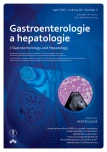Vedolizumab in the therapy of Crohn’s disease
Authors:
M. Lukáš
Authors‘ workplace:
Klinické a výzkumné centrum pro idiopatické střevní záněty ISCARE I. V. F. a. s. a Ústav lékařské biochemie a laboratorní diagnostiky, 1. LF UK a VFN v Praze
Published in:
Gastroent Hepatol 2015; 69(2): 146-150
Category:
IBD: Review Article
doi:
https://doi.org/10.14735/amgh2015146
Overview
Vedolizumab is a monoclonal IgG1 anti integrine antibody, which a few months ago was approved in the European Union for clinical practice use in the therapy of idiopathic bowel diseases. It is expected that this year vedolizumab will be available on the market in the Czech Republic. The clinical research called GEMINI II‑III proved that vedolizumab is a very effective drug in patients with moderate to severe Crohn’s disease. Significant advantages of vedolizumab therapy include high efficacy in patients failing on anti‑TNFα therapy, sustained response with increasing effect over time, minimal drug immunogenicity and high safety drug profile, which is caused by high selectivity for gastrointestinal tract. There are some disadvantages or uncertainties, which include a slow anti‑inflammatory therapeutic response, restricted effect on extraintestinal manifestations and limited potential for healing of perianal Crohn’s disease.
Key words:
vedolizumab – Crohn’s disease – biological therapy
Sources
1. Lukáš M. Současnost a budoucnost v léčbě Crohnovy nemoci. Gastroent Hepatol 2013; 67(4): 306 – 312.
2. Bortlík M. Vedolizumab – nová antiintegrinová protilátka s vysokou gastrointestinální selektivitou. Gastroent Hepatol 2014; 68(6): 481 – 484. doi: 10.14735/ amgh2014481.
3. Raine T. Vedolizumab for inflammatory bowel disease: Changing the game, or more of the same? United European Gastroenterol J 2014; 2(5): 333 – 344. doi: 10.1177/ 2050640614550672.
4. Sandborn WJ, Feagan BG, Rutgeerts P et al. Vedolizumab as induction and maintenance therapy for Crohn’s disease. N Engl J Med 2013; 369(8): 711 – 721. doi: 10.1056/ NEJMoa1215739.
5. Sanborn WJ, Colombel JF, Enns R et al. Natalizumab induction and maintenance therapy for Crohn’s disease. N Engl J Med 2005; 353(18): 1912 – 1925.
6. Sands BE, Feagan BG, Rutgeerts P et al.Effects of vedolizumab induction therapy for patients with Crohn’s disease in whom tumor necrosis factor antagonist treatment failed. Gastroenterology 2014; 147(3): 618 – 627. doi: 10.1053/ j.gastro.2014.05.008.
Labels
Paediatric gastroenterology Gastroenterology and hepatology SurgeryArticle was published in
Gastroenterology and Hepatology

2015 Issue 2
- Possibilities of Using Metamizole in the Treatment of Acute Primary Headaches
- Metamizole at a Glance and in Practice – Effective Non-Opioid Analgesic for All Ages
- Metamizole vs. Tramadol in Postoperative Analgesia
- Spasmolytic Effect of Metamizole
- The Importance of Limosilactobacillus reuteri in Administration to Diabetics with Gingivitis
-
All articles in this issue
- Noninvasive diagnostics in NAFLD
- Autochthonous case of hepatitis E virus in Slovakia
- Twenty years of experience with ERCP in the University Hospital Motol
- Esophageal motility disorders – The Chicago classification, v3.0
- Atypical picture of colon infiltration with lymphoma in a patient with chronic lymphocytic leukaemia
- Vedolizumab in the therapy of Crohn’s disease
- Novel oral anticoagulants – the advantages and drawbacks of the therapy
- Report of XXth Gastroforum
- ECCO – Inflammatory Bowel Diseases 2015
- IBD working days 2015, Hořovice
- New web platform of Gastroenterology and Hepatology journal and co-operation with the National Library of Medicine
- Informations from the editors
- Maltofer®
- Not only about hepatitis
- Therapy of chronic hepatitis C with simeprevir
- Functional variants of metalloproteinase MMP‑ 1 and MMP‑ 7 genes have no relationship to the severity of portal hypertension in patients with cirrhosis
- Gastroenterology and Hepatology
- Journal archive
- Current issue
- About the journal
Most read in this issue
- Maltofer®
- Atypical picture of colon infiltration with lymphoma in a patient with chronic lymphocytic leukaemia
- Novel oral anticoagulants – the advantages and drawbacks of the therapy
- Esophageal motility disorders – The Chicago classification, v3.0
